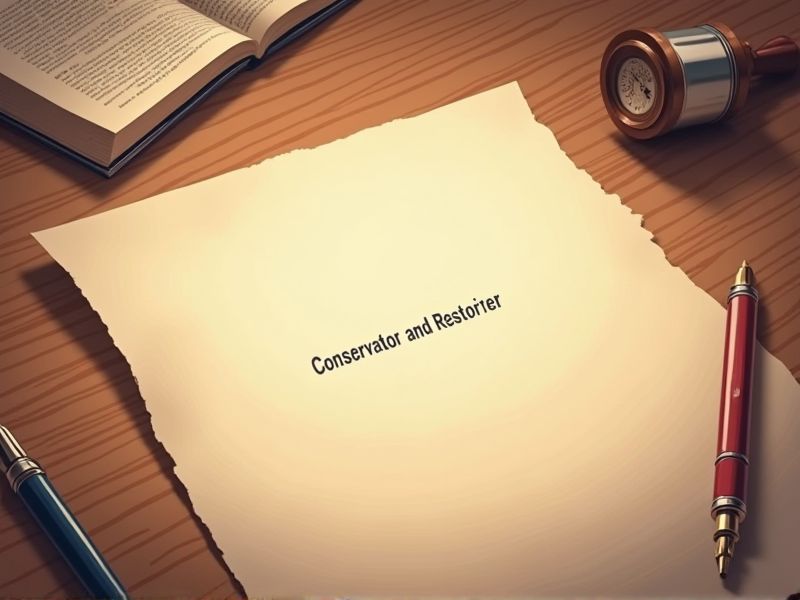
Conservators and restorers deal with delicate and often priceless artifacts, which require specialized knowledge to preserve their integrity. Certification ensures these professionals possess the necessary skills in material science, historical research, and advanced restoration techniques. Many organizations and institutions demand certified professionals to comply with best practice standards and ethical guidelines. Some critical certifications you may need for a career as a Conservator and Restorer are outlined below.
American Institute for Conservation (AIC) Conservation Certification
Obtaining an AIC Conservation Certification ensures that conservators and restorers adhere to established professional standards, which directly impacts the quality and integrity of their conservation work. Certification also provides a recognized credential that enhances credibility and trust with clients, institutions, and the broader community. The process of certification encourages continuous professional development, which keeps conservators updated with the latest techniques and ethical practices. Certification serves as a tool for the conservation community to self-regulate, ensuring that those involved in conservation work are qualified and committed to preserving cultural heritage responsibly.
International Institute for Conservation (IIC) Professional Certification
The IIC Professional Certification ensures conservators and restorers meet global standards in preserving cultural heritage. Obtaining this certification often leads to increased recognition and credibility in the field. It also fosters continuous professional development, keeping professionals updated on the latest conservation techniques. Employers and institutions may prefer certified individuals, as it reduces the risk of improper restoration practices.
Certified Art Conservation Technician (CACT)
Certified Art Conservation Technicians (CACT) provide essential technical support to conservators by preparing artworks for treatment, ensuring that conservation processes are precise and safe. Their specialized training helps in accurately documenting the condition of artworks, which is crucial for planning and executing restoration strategies. CACTs assist in maintaining controlled environments, thus preventing further deterioration during the conservation process. Their presence allows conservators to focus more on complex restoration tasks, improving efficiency and the overall quality of conservation efforts.
Certified Museum Conservation Specialist (CMCS)
The involvement of a Certified Museum Conservation Specialist (CMCS) ensures adherence to industry standards in preservation and restoration. Possessing up-to-date knowledge on the latest scientific methods and preservation techniques, a CMCS effectively mitigates potential damage to artifacts. Specialized training in ethical considerations informs the decision-making process in handling culturally significant items. Access to advanced resources and networks enhances the ability to address complex conservation challenges effectively.
AAM Council Certification in Museum Conservation
The AAM Council Certification in Museum Conservation ensures that conservators and restorers adhere to professional standards, thus maintaining the integrity and longevity of cultural artifacts. This certification provides credibility and recognition within the industry, enhancing job opportunities and career advancement. It fosters trust with stakeholders, including museums and the public, by guaranteeing a commitment to best practices. Continuous education and assessment through certification keep professionals updated with the latest conservation techniques and ethical guidelines.
National Association for Conservation Technology (NACT) Certification
The National Association for Conservation Technology (NACT) Certification is crucial for conservators and restorers as it ensures a standardized level of expertise across the industry. Certification provides professionals with validation of their skills and knowledge, enhancing their credibility and trust with clients and institutions. It facilitates the adoption of best practices in conservation technology, fostering a community committed to preserving artifacts and artworks effectively. By requiring continuous education and adherence to ethical guidelines, the certification helps professionals stay updated with the latest advancements and methodologies in the field.
Certified Preventive Conservation Professional (CPCP)
Certified Preventive Conservation Professionals (CPCPs) are crucial for conservators and restorers because their specialized training reduces the risk of long-term damage to artifacts. By implementing CPCP protocols, these professionals extend the lifespan of cultural heritage objects. Their expertise in environmental control and materials science directly influences successful conservation outcomes. Professional certification enhances credibility and trust, ensuring adherence to industry standards and best practices.
Certified Cultural Heritage Conservator (CCHC)
The presence of a Certified Cultural Heritage Conservator (CCHC) ensures that conservation and restoration practices adhere to international standards, preserving artifacts' authenticity and historical value. A CCHC can provide expert guidance in handling diverse materials, reducing the risk of damage during restoration processes. Proper conservation led by a CCHC can increase the lifespan of cultural heritage items, facilitating educational and cultural enrichment for future generations. Certification confirms a conservator's proficiency, instilling trust among institutions and stakeholders regarding the care of valuable artifacts.
Certified Restoration Technician (CRT)
Hiring a Certified Restoration Technician (CRT) guarantees that historical artifacts receive care from professionals with rigorously tested skills and knowledge. This specialized training in modern repair techniques helps prevent further deterioration and potential loss of valuable cultural heritage. Expertise of a CRT ensures compliance with industry standards, minimizing risks associated with amateur conservation attempts. Professionals like CRTs stay updated on evolving conservation technologies and methods, enhancing the longevity and integrity of restored items.
Historic Preservation Certification (HPC)
Historic Preservation Certification is needed for a conservator and restorer because it validates their expertise in maintaining the cultural and historical integrity of artifacts. This certification ensures compliance with established preservation standards, which directly influences the longevity and aesthetic preservation of heritage objects. It enhances the professional's credibility, thereby increasing trust among clients and stakeholders in the heritage sector. Access to certified training programs also provides the latest practices and technologies crucial for effective conservation and restoration.
Summary
You gain credibility and trust from clients and institutions when you obtain certifications as a Conservator and Restorer. This qualification often leads to an increase in job opportunities and potentially higher pay scales. Institutions tend to prefer certified professionals, as they guarantee a standard of skill and knowledge. Over time, the quality of work and client satisfaction usually improves due to the adherence to industry standards and practices.
